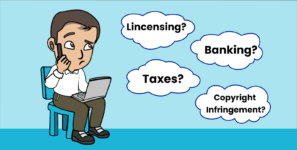Having been in the dropshipping business for the past year, and that too venturing into this without any prior experience of running any kind of business whatsoever, I made every kind of mistake humanly possible at the beginning. So now, that kind of makes me feel like I have seen enough to help out newbies on what mistakes not to make, and how to ensure your business is completely legal. This will ensure that your business remains yours and does not get caught in the net of the Feds.
Unfortunately, tons of people jump into e-commerce without doing any proper research about the realities of running a business, just after looking at the “success stories” of the dropshipping Gurus and their flashy lifestyles. The thing is, it’s not as easy to hit the off button once crap hits the fan, so it is always advised to do the groundwork before you start your own business.
It is not unheard of where a competitor has reported a site to the authorities just to get rid of them, so read on to learn how exactly to avoid such situations.
Licensing:

Before legally starting a dropshipping business, you have to take a deep look into the licensing and other legal issues related to it. You have to make to sure not leave any chance of being sued left and right, with you ending up losing more than you invested into the business.
First, you need to get your business’ name registered. You will need to register your business’s name with your State’s registrar and keep a copy of this registration to obtain other business licenses as well as open bank accounts.
The 3 main licenses that you need to pay attention to are as follows:
Sole Proprietorship:
This is the simplest business structure where there is no difference between your personal property and your business property. This offers no personal liability protection, so if your business ends up getting sued or maybe take over the government, you will lose your personal property as well. You need to report your business earnings in your personal tax information.
Limited Liability Company (LLC):
LLC establishes your business entity as a separate legal entity, thus protecting your personal assets in the process. It offers better protection than Sole Proprietorship but isn’t exactly foolproof. This is the best option for any starting dropshipper.
C Corporation:
This offers the most protection is done properly, thus most corporations opt for this. But, it is more expensive and prone to double taxation as well.
Banking:

A lot of people make the mistake of using their personal accounts for their business matters. It is of utmost importance to set up a new account for your business, this is because if a bank were to audit your accounts, they would potentially close your accounts and blacklist you. This also means that you may not be able to open any accounts elsewhere. It is far better to open business accounts with online banks, as they understand e-commerce way better than the physical ones.
Although it is a personal choice whether to use your personal credit card for banking or to use our business credit card, I would say chose your business credit card. This is because business credit cards tend to have much higher limits, so it is helpful when you need a decent credit limit to float money. Business credit cards offer excellent perks as well.
One more advantage to this is that separating your personal and business expenses really helps your bookkeeping work.
Taxes:

It is very important to get A Tax ID Number (TIN), which is also known as an EIN (Employer Identification Number), you can get a TIN by calling the IRS and requesting one. You do not necessarily need a TIN if you’re running your business with the sole proprietorship license, but it is recommended you obtain one as you’ll need it to convert your company to any other business-entity type in the future.
As a dropshipper, you will need to pay your Income tax, as well as your sales tax. You need to count your Income tax on your profits, not your total revenue though. Now, you will need to pay your Income tax to the country you are residing in, and not the place where your customers are. It is very important that you keep your invoices for these purposes. AliExpress does not provide you their invoices, which might be a headache, but you can use tools such as AliBilling to download your AliExpress invoice. This is where managing separate business accounts and personal accounts help.
Now if you do not stay in the US, then you do not have to worry over the sales tax, but if you do, then you need to pay the sales tax according to the state and cities you have nexus in.
Plagiarism/Copyright Infringement:

You must have read about the horror stories of people having to close down their stores due to copyright and plagiarism lawsuits. A lot of the products on Chinese supplier sites will be full of copyright images and trademarked products. Do not in any circumstances sell them even if they seem to be selling a lot and may seem very inviting.
You may end up losing 100s and 1000s of dollars if you are caught in an intellectual property/ copyright infringement suit. If for example, someone sends you a cease and desist notice beforehand, then well and good, but they are in no way legally required to do so. Although it is the manufacturer who will be sued in most cases, it is still better to secure yourself with a Dropshipping Agreement Contract to save yourself from being sued as complicit. Some companies might choose to sue you directly. Avoid using copyrighted images in your site as well.
It is always advised to consult with a tax advisor or tax attorney as the laws related to online business keeps on changing pretty quick. Most dropshipping gurus or sites do claim that you can start dropshipping within days, but that’s not the truth. There is more to a business than just opening an online store, at least if you want to go the legal way.








